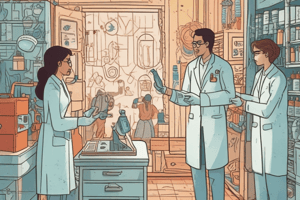Podcast
Questions and Answers
How does immunization contribute to herd immunity?
How does immunization contribute to herd immunity?
- By causing higher infection rates in the population
- By reducing the number of susceptible hosts (correct)
- By increasing the number of susceptible individuals
- By strengthening the infectious agents
Which of the following is NOT a characteristic of live attenuated vaccines?
Which of the following is NOT a characteristic of live attenuated vaccines?
- They replicate in the host
- They cause serious disease (correct)
- They stimulate immune responses
- They resemble natural infection
What is a significant factor that makes an infectious agent a suitable candidate for vaccine development?
What is a significant factor that makes an infectious agent a suitable candidate for vaccine development?
- It causes a significant illness (correct)
- It is highly contagious
- It is easily treatable with antibiotics
- It has a low morbidity rate
Which type of vaccine is characterized by containing killed pathogens or inactivated toxins?
Which type of vaccine is characterized by containing killed pathogens or inactivated toxins?
What has been achieved by immunization programs concerning wild type poliomyelitis?
What has been achieved by immunization programs concerning wild type poliomyelitis?
What is the primary method by which live attenuated vaccines acquire reduced virulence?
What is the primary method by which live attenuated vaccines acquire reduced virulence?
Which of the following is NOT an advantage of live attenuated vaccines?
Which of the following is NOT an advantage of live attenuated vaccines?
What is a characteristic of inactivated viral vaccines?
What is a characteristic of inactivated viral vaccines?
Which of the following statements about inactivated vaccines is true?
Which of the following statements about inactivated vaccines is true?
What is a major disadvantage of live attenuated vaccines?
What is a major disadvantage of live attenuated vaccines?
Study Notes
Immune Response and Immunization
- Immunized individuals experience a faster and stronger immune response compared to unimmunized individuals.
- Immunization helps halt infectious agent spread through herd immunity, protecting both the individual and the community.
- A significant illness-causing organism is a prime candidate for vaccine development.
Achievements of Immunization Programs
- Protection against diseases such as rabies and tetanus.
- Control of measles, mumps, rubella, varicella zoster, influenza, and rotavirus.
- Global elimination of wild-type poliomyelitis, smallpox eradication.
- Reduction in cancer risks associated with human papillomavirus (HPV) and hepatitis B virus (HBV).
- Vaccine-preventable diseases still occur due to limited access and high costs in developing countries.
Types of Vaccines
- Live Attenuated Vaccines (LAV)
- Inactivated Vaccines
- Component Vaccines (subunit vaccines)
- Toxoid Vaccines
- Naked DNA Vaccines
- mRNA Vaccines
Live Attenuated Vaccines (LAV)
- Derived from modified organisms (viruses or bacteria) made less virulent, enabling replication in the host without severe disease.
- Simulates natural infections, resulting in comprehensive immune responses (humoral, cellular, and memory).
- Examples: oral polio vaccine, measles, rotavirus, BCG vaccine for tuberculosis.
Preparation of LAV
- Avirulent or attenuated organisms are utilized, which have reduced ability to cause illness.
- Attenuation methods include:
- Growth under non-physiological conditions.
- Serial passage through tissue cultures to select less virulent strains.
- Genetic engineering to inactivate virulence genes.
- Recombinant vector vaccines where a gene insert leads to an immune response.
Advantages of LAV
- Efficient and long-lasting immunity.
- Immune response mimics natural infections.
- Produces IgA at infection entry points.
- Stimulates strong cell-mediated immunity.
Disadvantages of LAV
- Potential risk of reversion to virulence.
- Requires careful storage and handling due to limited shelf life.
- Possible interference with co-infecting viruses.
- Not suitable for immunocompromised individuals or pregnant women.
Inactivated Vaccines
- Comprised of killed organisms that can no longer reproduce, aimed at eliciting an antibody immune response.
Preparation of Inactivated Vaccines
- Killed through chemicals (like formalin) or physical methods (irradiation or heat).
- Adjuvants such as aluminum hydroxide enhance immunogenicity.
- Examples: Rabies, Influenza, Polio (Salk), Hepatitis A vaccines (killed viral) and Cholera, Q fever vaccines (killed bacterial).
Advantages of Inactivated Vaccines
- No risk of reverting to virulence.
- Safe for immunocompromised patients and during pregnancy.
Disadvantages of Inactivated Vaccines
- Generally provide brief immunity, requiring boosters for continued effectiveness.
- Primarily induce humoral immunity; cell-mediated responses tend to be weak.
- Local IgA response at entry points is not elicited.
- Higher doses may be necessary to produce adequate immunity.
Studying That Suits You
Use AI to generate personalized quizzes and flashcards to suit your learning preferences.
Description
This quiz covers the immune response and the significance of immunization. Learn about the achievements of immunization programs and the various types of vaccines available. Test your knowledge on how vaccines protect both individuals and communities from infectious diseases.




